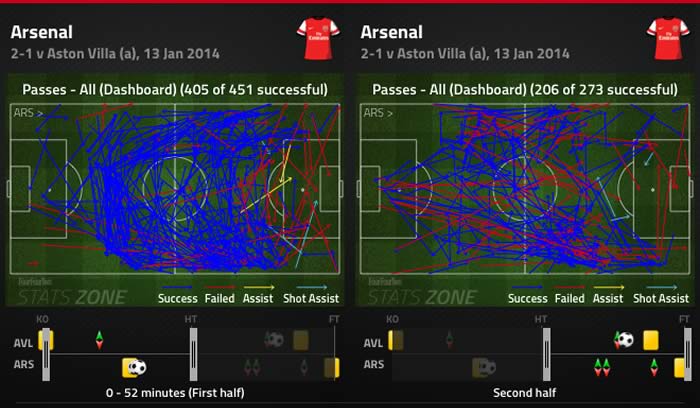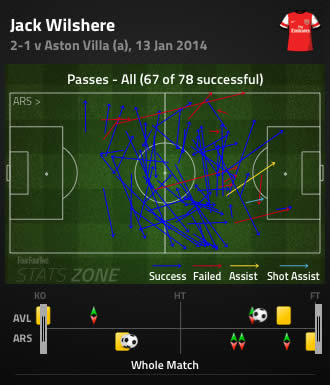For so long, Jack Wilshere has been touted as a future Arsenal captain and while his performance in Arsenal’s 2-1 win over at Aston Villa wasn’t so much as a “coming of age”, he managed to project his personality and his charisma on the game in the moments when it mattered.
He did that firstly by opening the scoring on 34 minutes, running into the space that Mesut Ozil vacated and then driving forward to receive Nacho Monreal’s cutback. And not more than a minute later, he delivered the decisive assist, Aston Villa giving the ball away after the restart and with the fire still in his belly, Wilshere chipped a magnificent pass to Olivier Giroud. The first touch was excellent, the second not so much but it was fortunate as it gave Giroud the time and space to drag his shot into the same corner Wilshere did less than 60 seconds before.
In a way, it always seemed likely that Jack Wilshere would make a telling contribution to the scoreline. There was a huge break in play before the goals as Aston Villa’s centre-back Nathan Baker had to be stretchered off with concussion, and Wilshere was visibly growing frustrated at Arsenal’s passive play. Villa were denying space behind the backline, instead allowing Arsenal to pass the ball left and right with relative comfort and without Theo Walcott, they were comfortable with that as they knew Arsenal had nobody who could make the runs in behind. Olivier Giroud flashed a header wide but that was the extent of The Gunners threat. The injury to Baker, however, opened up the game forcing Villa to switch from 3-5-2 to 4 -4-2 and that was enough to allow Wilshere the space make his trademark runs through the midfield.
There is an argument that Arsenal always needed a bit of time to settle anyway, and before the injury break – which lasted 10 minutes – they were showing signs that they might dominate. But of course, they never really did. There was no indication that they might score two or three more goals (there were only 8 shots on goal in total. Eight?!). Instead, they started the second-half sloppily, taking less care in their passes – perhaps because they felt the game was that easy in the middle of the park.
On the other hand, it’s true that Villa upped their tempo after the interval but only towards the last 10-15 minutes did they truly put Arsenal under danger. And it did become somewhat of an attrition after that although once again, Per Mertesacker and Laurent Koscielny defended superbly. It was symptomatic of Arsenal’s play then that when Aston Villa scored, it was a lax pass from Santi Cazorla which led to the goal. Mertesacker was understandably livid at the Spaniard for ruining his clean sheet.
In that sense then, you could say that grinding out the win in the second-half was a “sign of champions” as the cliché goes, where you win even when you play poorly. Except that’s the common misconception with the term “winning ugly”. Normally, it indicates a performance that when you’re under the cosh, you find a compromise between aesthetics and pragmatism. Arsenal did that in the 1-0 win against Newcastle where they were happy to defend for much of the match (and scored from a set-piece).
Here, Arsenal brought pressure upon themselves by constantly giving the ball away (Giroud was particularly culpable). Later they were forced to defend superbly but that’s not the sign of champions – letting opponents back into the game. Only the bit where Mertesacker and Koscielny – back by the whole back four/five – once again showed why they’re the best partnership in the Premier League was an indication of championship potential.

But then again, I might be being a bit harsh: because this idea of total domination is a fairly new one, one which has been made popular in recent times by Barcelona and Spain. Arsenal’s “Invincibles” side were not always the crushing machine we remember them to be. They suffered moments where they looked as vulnerable as any other side – heck they drew 12 times – but they were utterly ruthless.
I’ve written often this season about how Arsenal have managed moments better, where in key periods they’re able to find a compromise between their normal swashbuckling style and concerted defensive discipline, therefore I’m willing to file the second-half performance as something of an aberration rather than a sign that “things must get better otherwise Arsenal will be punished one day.” Besides, their title rivals have all consistently had matches like this in this Premier League season
In a way, it bodes well for Arsenal that they’re not at their best but they are still winning. Because under Wenger, you’ll know the football will improve. Against Aston Villa, Mesut Ozil was quietly effective, moving in and out of your vision like an eye floater, getting into spaces – as he did for the first-goal – and dictating play. Santi Cazorla was sloppy at times but his understanding with Ozil is important for Arsenal (they found each other 41 times in all) and he also made the most passes in the game.

It was Wilshere, though, who stepped up, at times playing the game at pace that he wanted. He’d stop play when things were getting scrappy, enabling others to get into position, and then inject pace into the game when it was needed with clever dummies or runs through the centre. It’s a different way of dictating the tempo of games, less subtle than Aaron Ramsey who is likely to complete more passes in the same position, but a way that allows him to stamp his personality on the game.
There were also clever switches of play, something we don’t typically associate with Wilshere, and a calmness on the ball that epitomises the stage that he is at in his development. Now, like how Ramsey used to, he doesn’t dwell on the ball, instead he pauses to better asses his options. Perhaps the ploy to use him out wide has worked, allowing him to “breathe more easily” now in the centre? It’s important because in his role, he needs to push out confidently so that Arsenal’s formation transforms quickly from 4-2-3-1 in the defensive phase to a 4-1-4-1 when Arsenal attack (and quickly vice-versa when Arsenal lose the ball). In crucial moments, Arsenal needed Wilshere to step up figuratively and literally, and he did. So did the defence, as they have all season.


